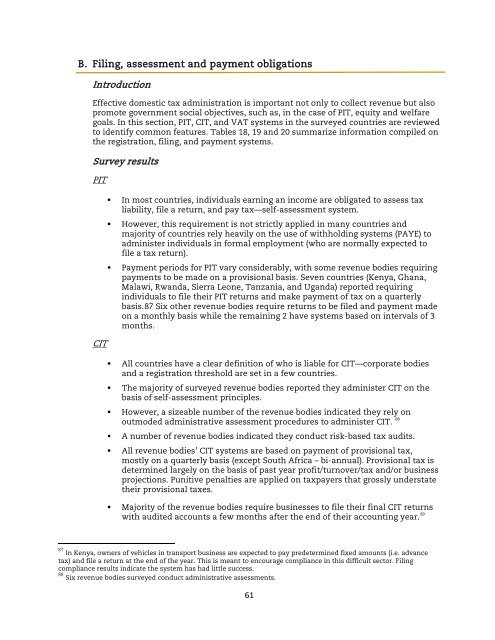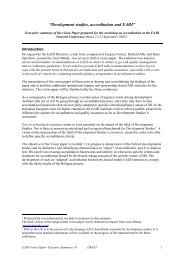Revenue Administration in Sub-Saharan Africa - International Tax ...
Revenue Administration in Sub-Saharan Africa - International Tax ...
Revenue Administration in Sub-Saharan Africa - International Tax ...
Create successful ePaper yourself
Turn your PDF publications into a flip-book with our unique Google optimized e-Paper software.
B. Fil<strong>in</strong>g, assessment and payment obligationsIntroductionEffective domestic tax adm<strong>in</strong>istration is important not only to collect revenue but alsopromote government social objectives, such as, <strong>in</strong> the case of PIT, equity and welfaregoals. In this section, PIT, CIT, and VAT systems <strong>in</strong> the surveyed countries are reviewedto identify common features. Tables 18, 19 and 20 summarize <strong>in</strong>formation compiled onthe registration, fil<strong>in</strong>g, and payment systems.Survey resultsPITCIT• In most countries, <strong>in</strong>dividuals earn<strong>in</strong>g an <strong>in</strong>come are obligated to assess taxliability, file a return, and pay tax—self-assessment system.• However, this requirement is not strictly applied <strong>in</strong> many countries andmajority of countries rely heavily on the use of withhold<strong>in</strong>g systems (PAYE) toadm<strong>in</strong>ister <strong>in</strong>dividuals <strong>in</strong> formal employment (who are normally expected tofile a tax return).• Payment periods for PIT vary considerably, with some revenue bodies requir<strong>in</strong>gpayments to be made on a provisional basis. Seven countries (Kenya, Ghana,Malawi, Rwanda, Sierra Leone, Tanzania, and Uganda) reported requir<strong>in</strong>g<strong>in</strong>dividuals to file their PIT returns and make payment of tax on a quarterlybasis.87 Six other revenue bodies require returns to be filed and payment madeon a monthly basis while the rema<strong>in</strong><strong>in</strong>g 2 have systems based on <strong>in</strong>tervals of 3months.• All countries have a clear def<strong>in</strong>ition of who is liable for CIT—corporate bodiesand a registration threshold are set <strong>in</strong> a few countries.• The majority of surveyed revenue bodies reported they adm<strong>in</strong>ister CIT on thebasis of self-assessment pr<strong>in</strong>ciples.• However, a sizeable number of the revenue bodies <strong>in</strong>dicated they rely onoutmoded adm<strong>in</strong>istrative assessment procedures to adm<strong>in</strong>ister CIT. 88• A number of revenue bodies <strong>in</strong>dicated they conduct risk-based tax audits.• All revenue bodies’ CIT systems are based on payment of provisional tax,mostly on a quarterly basis (except South <strong>Africa</strong> – bi-annual). Provisional tax isdeterm<strong>in</strong>ed largely on the basis of past year profit/turnover/tax and/or bus<strong>in</strong>essprojections. Punitive penalties are applied on taxpayers that grossly understatetheir provisional taxes.• Majority of the revenue bodies require bus<strong>in</strong>esses to file their f<strong>in</strong>al CIT returnswith audited accounts a few months after the end of their account<strong>in</strong>g year. 8987 In Kenya, owners of vehicles <strong>in</strong> transport bus<strong>in</strong>ess are expected to pay predeterm<strong>in</strong>ed fixed amounts (i.e. advancetax) and file a return at the end of the year. This is meant to encourage compliance <strong>in</strong> this difficult sector. Fil<strong>in</strong>gcompliance results <strong>in</strong>dicate the system has had little success.88 Six revenue bodies surveyed conduct adm<strong>in</strong>istrative assessments.61





